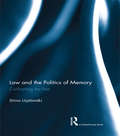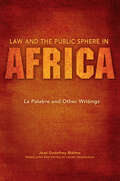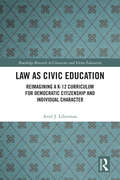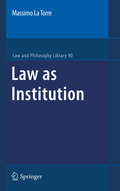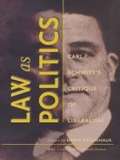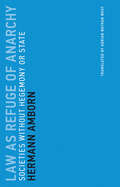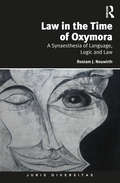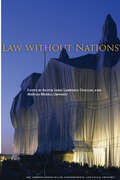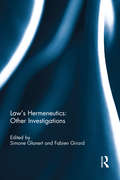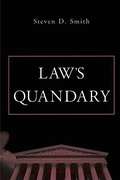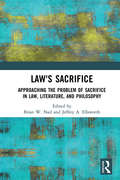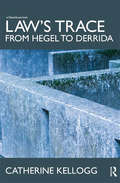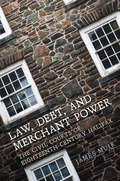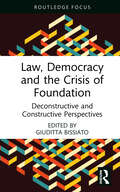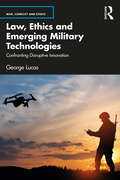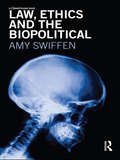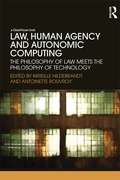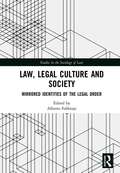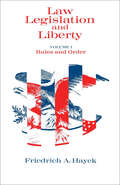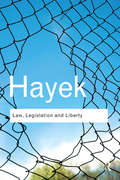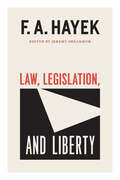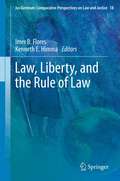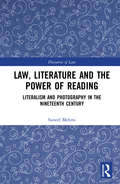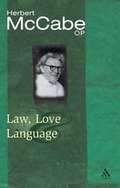- Table View
- List View
Law and the Politics of Memory: Confronting the Past
by Stiina LoytomakiLaw and the Politics of Memory: Confronting the Past examines law’s role as a tool of memory politics in the efforts of contemporary societies to work through the traumas of their past. Using the examples of French colonialism and Vichy, as well as addressing the politics of memory surrounding the Holocaust, communism and colonialism, this book provides a critical exploration of law’s role in ‘belated’ transitional justice contexts. The book examines how and why law has become so central in processes in which the past is constituted as a series of injustices that need to be rectified and can allegedly be repaired. As such, it explores different legal modalities in processes of working through the past; addressing the implications of regulating history and memory through legal categories and legislative acts, whilst exploring how trials, restitution cases, and memory laws manage to fulfil such varied expectations as clarifying truth, rendering homage to memory and reconciling societies. <P><P> Legal scholars, historians and political scientists, especially those working with transitional justice, history and memory politics in particular, will find this book a stimulating exploration of the specificity of law as an instrument and forum of the politics of memory.
Law and the Public Sphere in Africa: La Palabre and Other Writings (World Philosophies)
by Jean Godefroy BidimaA pioneering collection of essays that casts “an invigorating light on law, politics, public language and social practice in modern Africa” (Africa).Jean Godefroy Bidima’s La Palabre examines the traditional African institution of palaver as a way to create dialogue and open exchange in an effort to resolve conflict and promote democracy. In the wake of South Africa’s Truth and Reconciliation Commissions and the gacaca courts in Rwanda, Bidima offers a compelling model of how to develop an African public space where dialogue can combat misunderstanding. This volume, which includes other essays on legal processes, cultural diversity, memory, and the internet in Africa, offers English-speaking readers the opportunity to become acquainted with a highly original and important postcolonial thinker.“Bidima has done a very important work here which deserves the critical attention of philosophers, political theorists, legal scholars as well the general public.” —Journal of Modern African Studies“Opens promising vistas for legal and political discourse. Its multidisciplinary orientation and the erudition of the author make for a text that has crossover appeal.” —Olúfémi Táíwò, Cornell University“Presents a valuable philosophical argument that will most certainly be of interest to those working on the topics of postconflict justice, peacebuilding, and democratization in Africa.” —African Conflict and Peacebuilding Review
Law as Civic Education: Reimagining a K-12 Curriculum for Democratic Citizenship and Individual Character (Routledge Research in Character and Virtue Education)
by Ariel LibermanIf a civic education is the essential foundation for a functioning, discursive democracy, how should it be taught? This book offers an innovative solution, arguing that far from abandoning the often- grand promise of civic education as a means of cultivating reasoning skills and democratic character, we should embrace it, and proposes a reimagined civic education based on teaching students in primary and secondary school law and legal reasoning.Drawing on a range of theoretical disciplines— law, philosophy, ethics, sociology, psychology, and moral educational and child development theory— this monograph justifies the benefits of law learning as a form of character and civic education and offers historical and comparative educational examples to show what is possible. It demonstrates how legal teaching can be incorporated into a K- 12 curriculum and argues that such training can be transformative, guiding students to become citizens capable of meeting the demands of democracy: citizens with stronger reasoning skills, a motivation to self- examine their values and beliefs and bring them into conversation with social values, and an ability to effectively navigate political institutions and participate in public discourse.This compelling and deeply original work will be of interest to scholars and educators in the fields of civic education, character and virtue education, legal studies, and philosophy of education.
Law as Institution
by Massimo La TorreThe book's argument moves from discussing the relation between law and power. Theories defending the primacy of law over power are played against doctrines which center around the prevailing role of law. Legal positivism and natural law are here the real issue at stake. Constitutionalism and the rule of law are then seen as a development of the modern natural law tradition. But the book's main move is a consideration of law as a phenomenon possibly connected with language. Once traditional imperativist strategies are seen as unsatisfactory, and nevertheless law is accepted as being a social fact, there is the possibility of addressing such fact as somehow analogically linked with a system of language. In a sense, language is thought of as fundamental or primordial ontological dimension, so that this can offer the key to address and understand the question of what reality is. The question of meaning overlaps that of being, not only as far as the being of the world is concerned but also with respect to the nature of law. The concept of law -could not be approached without addressing the issue of law as a language. To this purpose "use theory" is assessed and taken as a possible candidate to build up a sensible theory of legal validity. From this angle institutionalism is then seen to be the most fruitful approach to conceptualize the ontology of law, though some reform in the standard theory and in its more recent developments is proposed to render more plausible the notion of "institution". Finally, the strong normative side of a (legal) institution is studied. The relation of law and morality is assessed by pointing out the difference between the "constitutive" character of law and the "regulative" core of morality. However, an institution is both an "is" and an "ought", while law is at the same time "facticity" and "normativity.
Law as Politics: Carl Schmitt’s Critique of Liberalism
by David DyzenhausWhile antiliberal legal theorist Carl Schmitt has long been considered by Europeans to be one of this century's most significant political philosophers, recent challenges to the fundamental values of liberal democracies have made Schmitt's writings an unavoidable subject of debate in North America as well. In an effort to advance our understanding not only of Schmitt but of current problems of liberal democracy, David Dyzenhaus presents translations of classic German essays on Schmitt alongside more recent writings by distinguished political theorists and jurists. Neither a defense of nor an attack on Schmitt, Law as Politics offers the first balanced response to his powerful critique of liberalism. One of the major players in the 1920s debates, an outspoken critic of the Versailles Treaty and the Weimar Constitution, and a member of the Nazi party who provided juridical respectability to Hitler's policies, Schmitt contended that people are a polity only to the extent that they share common enemies. He saw the liberal notion of a peaceful world of universal citizens as a sheer impossibility and attributed the problems of Weimar to liberalism and its inability to cope with pluralism and political conflict. In the decade since his death, Schmitt's writings have been taken up by both the right and the left and scholars differ greatly in their evaluation of Schmitt's ideas. Law as Politics thematically organizes in one volume the varying engagements and confrontations with Schmitt's work and allows scholars to acknowledge--and therefore be in a better position to negotiate--an important paradox inscribed in the very nature of liberal democracy. Law as Politics will interest political philosophers, legal theorists, historians, and anyone interested in Schmitt's relevance to current discussions of liberalism.Contributors. Heiner Bielefeldt, Ronald Beiner, Ernst-Wolfgang Bockenforde, Renato Cristi, David Dyzenhaus, Robert Howse, Ellen Kennedy, Dominique Leydet, Ingeborg Maus, John P. McCormick, Reinhard Mehring, Chantal Mouffe, William E. Scheuerman, Jeffrey Seitzer
Law as Refuge of Anarchy: Societies without Hegemony or State (Untimely Meditations #15)
by Hermann AmbornA study of communities in the Horn of Africa where reciprocity is a dominant social principle, offering a concrete countermodel to the hierarchical state.Over the course of history, people have developed many varieties of communal life; the state, with its hierarchical structure, is only one of the possibilities for society. In this book, leading anthropologist Hermann Amborn identifies a countermodel to the state, describing communities where reciprocity is a dominant social principle and where egalitarianism is a matter of course. He pays particular attention to such communities in the Horn of Africa, where nonhierarchical, nonstate societies exist within the borders of a hierarchical structured state. This form of community, Amborn shows, is not a historical forerunner to monarchy or the primitive state, nor is it obsolete as a social model. These communities offer a concrete counterexample to societies with strict hierarchical structures.Amborn investigates social forms of expression, ideas, practices, and institutions that oppose the hegemony of one group over another, exploring how conceptions of values and laws counteract tendencies toward the accumulation of power. He examines not only how the nonhegemonic ethos is reflected in law but also how anarchic social formations can exist. In the Horn of Africa, the autonomous jurisdiction of these societies protects against destructive outside influences, offers a counterweight to hegemonic violence, and contributes to the stabilization of communal life. In an era of widespread dissatisfaction with Western political systems, Amborn's study offers an opportunity to shift from traditional theories of anarchism and nonhegemony that project a stateless society to consider instead stateless societies already in operation.
Law in the Time of Oxymora: A Synaesthesia of Language, Logic and Law (Juris Diversitas)
by Rostam J. NeuwirthWhat do different concepts like true lie, bad luck, honest thief, old news, spacetime, glocalization, symplexity, sustainable development, constant change, soft law, substantive due process, pure law, bureaucratic efficiency and global justice have in common? What connections do they share with innumerable paradoxes, like the ones of happiness, time, globalization, sex, and of free will and fate? Law in the Time of Oxymora provides answers to these conundrums by critically comparing the apparent rise in recent years of the use of rhetorical figures called "essentially oxymoronic concepts" (i.e. oxymoron, enantiosis and paradoxes) in the areas of art, science and law. Albeit to varying degrees, these concepts share the quality of giving expression to apparent contradictions. Through this quality, they also challenge the scientific paradigm rooted in the dualistic thinking and binary logic that is traditionally used in the West, as opposed to the East, where a paradoxical mode of thinking and fuzzy logic is said to have been cultivated. Following a review of oxymora and paradoxes in art and various scientific writings, hundreds of "hard cases" featuring oxymora and a comprehensive review of the legal literature are discussed, revealing evidence suggesting that the present scientific paradigm of dualism alone will no longer be able to tackle the challenges arising from increasing diversity and complexity coupled with an apparent acceleration of change. Law in the Time of Oxymora reaches the surprising conclusion that essentially oxymoronic concepts may inaugurate a new era of cognition, involving the ways the senses interact and how we reason, think and make decisions in law and in life.
Law without Nations
by Austin Sarat Lawrence Douglas Martha UmphreyAs the editors (all of Amherst College) explain in their introduction, how one conceptualizes the idea of "law without nations" depends very much on how one theorizes "the nation." A Hobbesian view of the nation as the state suggests that there can be no such thing as "law without nations." The development of doctrines of international crimes such as genocide suggests that law can exist above and beyond the nation, however defined. Understanding "the nation" either in the sense of the German concept of "das Volk" or as an expression of social solidarity (without, necessarily, the exclusivist connotations of "das Volk") can lead to an understanding of the law as embodying and expressing "matters of tradition, affect, belief, and ultimate values," and thus "law without nations" suggests either an impossibility or the imposition of artificial legality from the outside. Finally, in liberal legality, which sees law as the creator of social solidarity and the vehicle for promoting social justice, "law without nations" can be understood as the culmination of the liberal ideal. It is the tensions between these different ways of understanding "law without nations" that animate the six essays presented here, which explore such specific topics as the legal relationship between the nation-state and a globalized world as pertaining to the punishment of crime and the waging of war; issues of comparative constitutionalism (the US Supreme Court citing decisions of foreign domestic national courts, for instance); the conceptual development of Jewish law in the absence of a state for the nation; the recent development of Islamic Sharia Law as a form of supranational legality arising out of the void of failing states; international law as a facilitator of ethnic displacement and exclusion; and law within a liberal multinational empire. Annotation ©2011 Book News, Inc., Portland, OR (booknews.com)
Law's Hermeneutics: Other Investigations
by Fabien Girard Simone GlanertBringing together leading academics hailing from different cultural and scholarly horizons, this book revisits legal hermeneutics by making particular reference to philosophy, sociology and linguistics. On the assumption that theory has much to teach law, that theory motivates and enables, the writings of such intellectuals as Martin Heidegger, Hans-Georg Gadamer, Jacques Derrida, Paul Ricœur, Giorgio Agamben, Jürgen Habermas, Ronald Dworkin and Ludwig Wittgenstein receive special consideration. As it explores the matter of reading the law and as it inquires into the emergence of meaning within the dynamic between reader and text against the background of the reader’s worldly finiteness, this collection of essays wishes to contribute to an improved appreciation of the merits and limits of law’s hermeneutics which, it argues, is emphatically not to be reduced to a simple tool for textual exegesis.
Law's Quandary
by Steven D. SmithThis lively book reassesses a century of jurisprudential thought from a fresh perspective, and points to a malaise that currently afflicts not only legal theory but law in general. Steven Smith argues that our legal vocabulary and methods of reasoning presuppose classical ontological commitments that were explicitly articulated by thinkers from Aquinas to Coke to Blackstone, and even by Joseph Story. But these commitments are out of sync with the world view that prevails today in academic and professional thinking. So our law-talk thus degenerates into "just words"--or a kind of nonsense. The diagnosis is similar to that offered by Holmes, the Legal Realists, and other critics over the past century, except that these critics assumed that the older ontological commitments were dead, or at least on their way to extinction; so their aim was to purge legal discourse of what they saw as an archaic and fading metaphysics. Smith's argument starts with essentially the same metaphysical predicament but moves in the opposite direction. Instead of avoiding or marginalizing the "ultimate questions," he argues that we need to face up to them and consider their implications for law.
Law's Sacrifice: Approaching the Problem of Sacrifice in Law, Literature, and Philosophy
by Brian W. Nail Jeffrey A. EllsworthThis volume examines the relationship between law and sacrifice as a crucial nexus for theorizing the dynamics of creation, destruction, transcendence, and violence within the philosophical and legal discourse of western society. At a time of populist political unrest, what philosophical and theoretical resources are available for conceptualizing the discontent that seems to emanate from practically every sphere of society? What narrative strategies have been employed within literary, theological, philosophical, and legal discourse to tame or mystify human violence? Engaging with the work of preeminent theorists of sacrifice, such as Georges Bataille, René Girard, Giorgio Agamben, and Jacques Derrida this collection examines from an interdisciplinary perspective the sacrificial logic that characterizes the cultural and political dynamics of law in society. The book will be of interest to students and scholars in the field of legal theory and philosophy.
Law's Trace: From Hegel to Derrida
by Catherine KelloggLaw's Trace argues for the political importance of deconstruction by taking Derrida’s reading of Hegel as its point of departure. While it is well established that seemingly neutral and inclusive legal and political categories and representations are always, in fact, partial and exclusive, among Derrida’s most potent arguments was that the exclusions at work in every representation are not accidental but constitutive. Indeed, one of the most significant ways that modern philosophy appears to having completed its task of accounting for everything is by claiming that its foundational concepts – representation, democracy, justice, and so on – are what will have always been. They display what Derrida has called a "fabulous retroactivity." This means that such forms of political life as liberal constitutional democracy, capitalism, the rule of law, or even the private nuclear family, appear to be the inevitable consequence of human development. Hegel’s thought is central to the argument of this book for this reason: the logic of this fabulous retroactivity was articulated most decisively for the modern era by the powerful idea of the Aufhebung – the temporal structure of the always-already. Deconstruction reveals the exclusions at work in the foundational political concepts of modernity by ‘re-tracing’ the path of their creation, revealing the ‘always-already’ at work in that path. Every representation, knowledge or law is more uncertain than it seems, and the central argument of Law's Trace is that they are, therefore, always potential sites for political struggle.
Law, Debt, and Merchant Power: The Civil Courts of 18th Century Halifax
by The Osgoode Society James MuirIn the early history of Halifax (1749-1766), debt litigation was extremely common. People from all classes frequently used litigation and its use in private matters was higher than almost all places in the British Empire in the 18th century. In Law, Debt, and Merchant Power, James Muir offers an extensive analysis of the civil cases of the time as well as the reasons behind their frequency. Muir's lively and detailed account of the individuals involved in litigation reveals a paradoxical society where debtors were also debt-collectors. Law, Debt, and Merchant Power demonstrates how important the law was for people in their business affairs and how they shaped it for their own ends.
Law, Democracy and the Crisis of Foundation: Deconstructive and Constructive Perspectives (Law and Politics)
by Giuditta BissiatoThis book addresses the crisis of the juridical-political foundation within contemporary democracies.Although modernity is the age of foundation, it is marked by what Carl Schmitt referred to as a peculiar ‘dialectic of presence and absence’ – and this is true even for those theories that seem to be the greatest supporters of the necessity of some kind of foundation, such as the Hobbesian commonwealth. This instability of foundation is inherent in the concept of ‘political representation’, which brings into being an idea – such as that of ‘nation’, ‘people’ or ‘popular will’ – which cannot, however, actually correspond to any empirical reality. Is it possible, then, to identify an absolute, certain and stable foundation capable of generating and guaranteeing the persistence of a legal and political structure? Or does this very question bind us to the history of an impossibility: a foundational absence, or void, whose presence is only now being strongly felt? Engaging both historical and contemporary perspectives, this book addresses the problem of foundation through both deconstructive and constructive perspectives – which respectively aim to challenge the very idea of foundation, or to overcome its contemporary crisis in order to present new, post-foundational possibilities.This book will be of interest to scholars and researchers working in the areas of legal and political theory.
Law, Ethics and Emerging Military Technologies: Confronting Disruptive Innovation (War, Conflict and Ethics)
by George LucasThis book addresses issues of legal and moral governance arising in the development, deployment, and eventual uses of emerging technologies in military operations. Proverbial wisdom has it that law and morality always lag behind technological innovation. Hence, the book aims to identify, enumerate, and constructively address the problems of adequate governance for the development, deployment, and eventual uses of military technologies that have been newly introduced into military operations or which will be available in the near future. Proposals for modifications in governance, the book argues, closely track the anxieties of many critics of these technologies to the extent that they will proliferate, prove destructive in unanticipated ways, and partially or wholly escape regulation under current treaties and regulatory regimes. In addition to such concerns in domestic and especially in international law, the book addresses ethical norms in the professions involved in the design and eventual use of specific technologies, principally involving the professional norms of practice in engineering and the military (as well as biomedical and health care practice), which impose moral obligations on their members to avoid reckless endangerment or criminal negligence in the course of their activities. Thus, in addition to exploring the application of existing legal regimes and moral norms, the book examines how these professions might develop or improve the voluntary constraints on forms of malfeasance that are enshrined in their histories and codes of best practices. This book should prove of great interest to students of ethics, military studies, philosophy of war and peace, law, and international relations.
Law, Ethics and the Biopolitical
by Amy SwiffenLaw, Ethics and the Biopolitical explores the idea that legal authority is no longer related to national sovereignty, but to the ‘moral’ attempt to nurture life. The book argues that whilst the relationship between law and ethics has long been a central concern in legal studies, it is now the relationship between law and life that is becoming crucial. The waning legitimacy of conventional conceptions of sovereignty is signalled the renewal of a version of natural law, evident in discourses of human rights, that de-emphasises the role of a divine law-giver in favour of an Aristotelian conception of the natural purpose of life and the ‘common good’. Synthesising elements of legal scholarship on sovereignty, theories of biopolitics and biopower, as well as recent developments in the domains of ethics, Amy Swiffen examines the invocation of ‘life’ as a foundation for legal authority. The book documents the connection between law, life and contemporary forms of biopolitical power by critically analysing the fundamental principles of the bioethical paradigm. Unique in its critical and cross-disciplinary approach, Law, Ethics and the Biopolitical will be of interest to students and teachers in the areas of law and society, law and literature, critical legal studies, social theory, bioethics, psychoanalysis, and biopolitics.
Law, Human Agency and Autonomic Computing: The Philosophy of Law Meets the Philosophy of Technology
by Mireille Hildebrandt Antoinette RouvroyLaw, Human Agency and Autonomic Computing interrogates the legal implications of the notion and experience of human agency implied by the emerging paradigm of autonomic computing, and the socio-technical infrastructures it supports. The development of autonomic computing and ambient intelligence – self-governing systems – challenge traditional philosophical conceptions of human self-constitution and agency, with significant consequences for the theory and practice of constitutional self-government. Ideas of identity, subjectivity, agency, personhood, intentionality, and embodiment are all central to the functioning of modern legal systems. But once artificial entities become more autonomic, and less dependent on deliberate human intervention, criteria like agency, intentionality and self-determination, become too fragile to serve as defining criteria for human subjectivity, personality or identity, and for characterizing the processes through which individual citizens become moral and legal subjects. Are autonomic – yet artificial – systems shrinking the distance between (acting) subjects and (acted upon) objects? How ‘distinctively human’ will agency be in a world of autonomic computing? Or, alternatively, does autonomic computing merely disclose that we were never, in this sense, ‘human’ anyway? A dialogue between philosophers of technology and philosophers of law, this book addresses these questions, as it takes up the unprecedented opportunity that autonomic computing and ambient intelligence offer for a reassessment of the most basic concepts of law.
Law, Legal Culture and Society: Mirrored Identities of the Legal Order (Studies in the Sociology of Law)
by Alberto FebbrajoThis volume addresses the pluralistic identity of the legal order. It argues that the mutual reflexivity of the different ways society perceives law and law perceives society eclipses the unique formal identity of written law. It advances a distinctive approach to the plural ways in which legal cultures work in a modern society, through the metaphor of the mirror. As a mirror of society, it distinguishes between the structure and function of legal culture within the legal system, and the external representation of law in society. This duality is further problematized in relation to the increasing transnationalisation of law. Based on a multi-level interpretation of the concept of legal culture, the work is divided into three parts: the first addresses the mutual reflections of social and legal norms that support a pluralist representation of internal legal cultures, the second concentrates on the external legal cultures that constantly enable pragmatic adjustments of the legal order to its social environment, and the third concludes the book with a theoretical discussion of the issues presented.
Law, Legislation and Liberty, Volume 1: Rules and Order (Law, Legislation and Liberty)
by Friedrich A. HayekFrom a Nobel Laureate economist, “after more than half a century, Rules and Order remains an essential book for anybody interested in politics or law” (EconLib).F. A. Hayek made many valuable contributions to the field of economics as well as to the disciplines of philosophy and politics. This volume represents the first section of Hayek’s comprehensive three-part study of the relations between law and liberty. Rules and Order constructs the framework necessary for a critical analysis of prevailing theories of justice and of the conditions which a constitution securing personal liberty would have to satisfy.
Law, Legislation and Liberty: A new statement of the liberal principles of justice and political economy (Routledge Classics)
by F. A. HayekWith a new foreword by Paul Kelly 'I regard Hayek's work as a new opening of the most fundamental debate in the field of political philosophy' – Sir Karl Popper 'This promises to be the crowning work of a scholar who has devoted a lifetime to thinking? about society and its values. The entire work must surely amount to an immense contribution to social and legal philosophy' - Philosophical Studies Law, Legislation and Liberty is Hayek's major statement of political philosophy and one of the most ambitious yet subtle defences of a free market society ever written. A robust defence of individual liberty, it is also crucial for understanding Hayek’s influential views concerning the role of the state: far from being an innocent bystander, he argues that the state has an important role to play in defending the norms and practices of an ordered and free society. His arguments had a profound influence on the policies of Thatcher in the 1980s and resonate today in visions of the ‘Big Society’. First published in three separate volumes, this Routledge Classics edition makes one of his most important books available in a single volume. Essential reading for understanding the background to the recent world economic turmoil and financial crisis, it also foreshadows the subsequent heated debate about regulation and political governance if such disasters are to be avoided in the future.
Law, Legislation, and Liberty, Volume 19: A New Statement Of The Liberal Principles Of Justice And Political Economy (Routledge Classics Ser. #19)
by F.A. HayekA new edition of F. A. Hayek’s three-part opus Law, Legislation, and Liberty, collated in a single volume In this critical entry in the University of Chicago’s Collected Works of F. A. Hayek series, political philosopher Jeremy Shearmur collates Hayek’s three-part study of law and liberty and places Hayek’s writings in careful historical context. Incisive and unrestrained, Law, Legislation, and Liberty is Hayek at his late-life best, making it essential reading for understanding the philosopher’s politics and worldview. These three volumes constitute a scaling up of the framework offered in Hayek’s famed The Road to Serfdom. Volume 1, Rules and Order, espouses the virtues of classical liberalism; Volume 2, The Mirage of Social Justice, examines the societal forces that undermine liberalism and, with it, liberalism’s capacity to induce “spontaneous order”; and Volume 3, The Political Order of a Free People, proposes alternatives and interventions against emerging anti-liberal movements, including a rule of law that resides in stasis with personal freedom. Shearmur’s treatment of this challenging work—including an immersive new introduction, a conversion of Hayek’s copious endnotes to footnotes, corrections to Hayek’s references and quotations, and the provision of translations to material that Hayek cited only in languages other than English—lends it new importance and accessibility. Rendered anew for the next generations of scholars, this revision of Hayek’s Law, Legislation, and Liberty is sure to become the standard.
Law, Liberty and State
by Thomas Poole David Dyzenhaus Dyzenhaus, David and Poole, Thomas"Oakeshott, Hayek and Schmitt are associated with a conservative reaction to the 'progressive' forces of the twentieth century. Each was an acute analyst of the juristic form of the modern state and the relationship of that form to the idea of liberty under a system of public, general law. Hayek had the highest regard for Schmitt's understanding of the rule of law state despite Schmitt's hostility to it, and he owed the distinction he drew in his own work between a purpose-governed form of state and a law-governed form to Oakeshott. However, the three have until now rarely been considered together, something which will be ever more apparent as political theorists, lawyers and theorists of international relations turn to the foundational texts of twentieth-century thought at a time when debate about liberal democratic theory might appear to have run out of steam"--
Law, Liberty, and the Rule of Law
by Imer B. Flores Kenneth E. HimmaIn recent years, there has been a substantial increase in concern for the rule of law. Not only have there been a multitude of articles and books on the essence, nature, scope and limitation of the law, but citizens, elected officials, law enforcement officers and the judiciary have all been actively engaged in this debate. Thus, the concept of the rule of law is as multifaceted and contested as it's ever been, and this book explores the essence of that concept, including its core principles, its rules, and the necessity of defining, or even redefining, the basic concept. Law, Liberty, and the Rule of Law offers timely and unique insights on numerous themes relevant to the rule of law. It discusses in detail the proper scope and limitations of adjudication and legislation, including the challenges not only of limiting legislative and executive power via judicial review but also of restraining active judicial lawmaking while simultaneously guaranteeing an independent judiciary interested in maintaining a balance of power. It also addresses the relationship not only between the rule of law, human rights and separation of powers but also the rule of law, constitutionalism and democracy.
Law, Literature and the Power of Reading: Literalism and Photography in the Nineteenth Century
by Suneel MehmiAt the intersection of law, literature and history, this book interrogates how a dominant contemporary idea of law emerged out of specific ideas of reading in the nineteenth century. Reading shapes our identities. How we read shapes who we are. Reading also shapes our conceptions of what the law is, because the law is also a practice of reading. Focusing on the works of key Victorian writers closely associated with legal practice, this book addresses the way in which the identity of the reader of law has been modelled on the identity of the political elite. At the same time, it shows how other readers of law have been marginalized. The book thus shows how a construction of the law has emerged from the ordering of a power that discriminates between different readers and readings. More specifically, and in response to the emerging media of photography – and, with it, potentially subversive ideas of exposure and visibility – the book shows that there have been dominant, hidden and unrecognised guides to legal reading and to legal thought. And in making these visible, the book also aims to make them contestable. This secret history of law will appeal to legal historians, legal theorists, those working at the intersection of law and literature and others with interests in law and the visual.
Law, Love and Language
by Herbert MccabeWhat is ethics all about? In this book Herbert McCabe suggests that it is about loving, obeying laws and talking to people. In doing so, he offers an introduction to ethical thinking for anyone with a serious interest in moral philosophy. He does so as someone who writes with a Christian audience in mind. Most of his arguments, however, do not presuppose a believing Christian readership.
